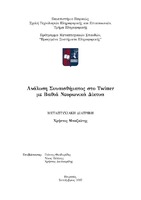| dc.contributor.advisor | Θεοδωρίδης, Ιωάννης | |
| dc.contributor.advisor | Πελέκης, Νικόλαος | |
| dc.contributor.advisor | Δουλκερίδης, Χρήστος | |
| dc.contributor.author | Μπαζιώτης, Χρήστος | |
| dc.date.accessioned | 2018-03-23T08:59:26Z | |
| dc.date.available | 2018-03-23T08:59:26Z | |
| dc.date.issued | 2017-09 | |
| dc.identifier.uri | https://dione.lib.unipi.gr/xmlui/handle/unipi/11110 | |
| dc.description.abstract | Η εργασία ασχολείται με το πρόβλημα της πρόβλεψης του συναισθηματικού
προσανατολισμού, σε μηνύματα του κοινωνικού δικτύου Twitter. Είναι ένα πρόβλημα Επεξεργασίας Φυσικής Γλώσσας (ΕΦΓ), το οποίο στα πλαίσια της εργασίας,
προσεγγίζεται με την χρήση Τεχνητών Νευρωνικών Δικτύων (ΤΝΔ) αξιοποιώντας
κατανεμημένες αναπαραστάσεις λέξεων (word embeddings).
Αρχικά, γίνεται αναδρομή της προόδου του επιστημονικού πεδίου της Ανάλυσης
Συναισθήματος (Sentiment Analysis). Στη συνέχεια καταγράφονται και συγκρίνονται οι σημαντικότερες προσεγγίσεις, οι οποίες έχουν προταθεί για την επίλυση του
προβλήματος. Ιδιαίτερη σημασία δίνεται στην αναζωπύρωση της έρευνας στα ΤΝΔ
και παρουσιάζονται οι σημαντικότερες αρχιτεκτονικές ΤΝΔ, οι οποίες έχουν εφαρμοστεί στην Ανάλυσης Συναισθήματος. Επιπλέον, γίνεται σύγκριση των ΤΝΔ με τις
παραδοσιακές τεχνικές μηχανικής μάθησης και παρουσιάζονται επιχειρήματα υπέρ
της καταλληλότητάς τους σε προβλήματα ΕΦΓ.
Ακόμη, για την καλύτερη προετοιμασία των μηνυμάτων του Twitter ως είσοδο
στα μοντέλα μηχανικής μάθησης, αναπτύχθηκε ένα εργαλείο προ-επεξεργασίας κειμένων. Το εργαλείο αυτό είναι ικανό να αναγνωρίσει και να επεξεργαστεί κείμενα
από κοινωνικά δίκτυα, στα οποία υπάρχουν αρκετά ορθογραφικά, συντακτικά και
γραμματικά λάθη, καθώς και γενικότερα “δημιουργική” γραφή. Μερικές από τις
δυνατότητες του εργαλείου είναι, λεκτική ανάλυση, ορθογραφική διόρθωση και κανονικοποίηση λέξεων και φράσεων.
Τέλος, στα πλαίσια της έρευνας για την εργασία, συμμετείχαμε στον διεθνή διαγωνισμό σημασιολογικής αξιολόγησης Semeval-2017. Τα μοντέλα του διαγωνισμού
είναι το ουσιαστικό αποτέλεσμα της έρευνάς μου. Γίνεται αναλυτική παρουσίαση
των σχετικών μοντέλων και δίνονται θεωρητικά επιχειρήματα για την καταλληλότητα της τελικής προσέγγισης. Τα μοντέλα που αναπτύχθηκαν ήταν ιδιαίτερα
ανταγωνιστικά, πετυχαίνοντας την πρώτη θέση στο Task 4:“Sentiment Analysis in
Twitter” και τη δεύτερη θέση στο Task 6: “#HashtagWars: Learning a Sense of Humor”
του Semeval-2017. | el |
| dc.format.extent | 130 | el |
| dc.language.iso | el | el |
| dc.publisher | Πανεπιστήμιο Πειραιώς | el |
| dc.rights | Attribution-NonCommercial-NoDerivatives 4.0 Διεθνές | * |
| dc.rights.uri | http://creativecommons.org/licenses/by-nc-nd/4.0/ | * |
| dc.title | Ανάλυση συναισθήματος στο twitter με βαθιά νευρωνικά δίκτυα | el |
| dc.type | Master Thesis | el |
| dc.contributor.department | Σχολή Τεχνολογιών Πληροφορικής και Επικοινωνιών. Τμήμα Πληροφορικής | el |
| dc.description.abstractEN | Sentiment analysis is an area in Natural Language Processing (NLP), studying
the identification and quantification of the sentiment expressed in text. The thesis
addresses the problem of predicting the sentiment of messages from Twitter microblogging
service. The task is approached using Artificial Neural Networks (ANN),
utilizing distributed text representations (word embeddings).
Firstly, a survey of the field of sentiment analysis is performed. Next, the most
important approaches for addressing the problem are reviewed. Special focus is given
to the resurgence of research in ANNs. Τhe most common ANN architectures, which
have been applied to sentiment analysis, are presented. Furthermore, a comparison is
being made between ANNs with the more traditional machine learning approaches,
providing theoretical justifications for choosing ANNs for modeling natural language.
Moreover, a text pre-processing tool was developed, for preparing the Twitter
messages before passing them as inputs to the machine learning models. The tool
is geared towards texts from social networks, which are very challenging to deal
with, because of their informal and “creative” writing style, with improper use of
grammar, figurative language, misspellings and slang. The text processing tool, is able
to utilize most of the information in text, performing sentiment-aware tokenization,
spell correction, word normalization, word segmentation (for splitting hashtags) and
word annotation.
Finally, in the context of my research, we participated in Semeval-2017, which
is an international competition for semantic evaluation of computational semantic
analysis systems. The models that were developed for the participation in Semeval,
were essentially the result of my research. A thorough analysis of these models is
given, along with the rationale behind each design decision. The models were very
competitive, achieving the first place in Task 4:“Sentiment Analysis in Twitter” and
the second place in Task 6: “#HashtagWars: Learning a Sense of Humor”. | el |
| dc.contributor.master | Προηγμένα Συστήματα Πληροφορικής | el |
| dc.subject.keyword | Ανάλυση συναισθήματος | el |
| dc.subject.keyword | Εξόρυξη γνώμης | el |
| dc.subject.keyword | Επεξεργασία φυσικής γλώσσας | el |
| dc.subject.keyword | Κατηγοριοποίηση κειμένων | el |
| dc.subject.keyword | Μηχανική μάθηση | el |
| dc.subject.keyword | Τεχνητά νευρωνικά δίκτυα | el |
| dc.subject.keyword | Βαθιά νευρωνικά δίκτυα | el |
| dc.subject.keyword | Sentiment analysis | el |
| dc.subject.keyword | Opinion mining | el |
| dc.subject.keyword | Natural language processing | el |
| dc.subject.keyword | Text classification | el |
| dc.subject.keyword | Machine learning | el |
| dc.subject.keyword | Artificial neural networks | el |
| dc.subject.keyword | Deep neural networks | el |
| dc.date.defense | 2017-09 | |



